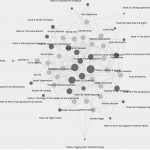
1.4 Activity Defining Terms
What do I think Text and Technology mean?
Text is a symbolic form of the language we use to communicate. Words are imbued with meaning and those words are able to be written using communally held symbols. The symbols allow a phonetic reading of the word which then corresponds to the orally accepted meaning. Text is the conventional way humans have developed in order to record oral communication. It has been developed only a handful of times in the history of man and it can take on different forms, from pictograms to phonetic symbols.
Technology is any tool or device or invention that allows advancement in any realm. A technology can be a physical implement or a new way of doing. For example, a spade is a hole digging technology and calculus is a mathematical technology. New technologies are created and adopted all the time, while some stick with us others are set aside.
What does the OED say about text and technology?
OED, Associations of text with scripture or other canonical writings. Textile associated to weaving, putting many smaller things together into a whole. Perhaps as many letters are weaved into text. Texture originally from the realm of weaving, now descriptive of the product of weaving, smooth or rough texture.
Technology emphasis on mechanical arts. Process, method and technique to the productions of goods. Technology as associated with treatise on a subject in the arts. Techno Greek prefix associated with carpentry or the production of goods. Latin text associations to textiles. Technique the practical skills associated to the production of any item where skills is required. Examples can be found for the production of music, art, fashion, relationships, skills in the creation of goods and in the performance of physical and mental tasks.
How does Google Ngram see Text and Technology?
The use of Text has a peak in the early and late 1500s. A low in the 1700s and a steady growth until the mid 1900s. A rise in its use in the 2000s which dips to in the present. A similar trend can be seen for the use of the word technology except that it arose earlier, in the early 1500s and dipped to almost no use until the 1950s. The rapid rise it its use also appears to peak in the 1990s and slope down from then to the present day. The graph suggests a leveling off of the use since 2010 at about 0.01%
How does the etymology of text and technology make me think about the importance and uses of the words?
Considering the words textile, text, technology and teche (teaching) I begin to create a picture of a culture where the skill of weaving raw materials together to form fabrics was a major value. The skill needed to do this type of work required a non-expert to learn from an expert and the abilities might have been valued as technique. The word text derived from the Latin texo or to weave, likely linked to earlier word tekso meaning to beget or produce. Only later would the word text become associated with printed language and canonical texts such as the bible or other scripture. Without going into the history of Europe too deeply it is possible that the usage of the word text so widely in the 1500s due to the publication of the first English bible. The use of the word text in our recent history has come to mean not only written language published in books but also the act of sending a written message to another via cellphones. Text can also be applied to integrated materials which include graphics, images, infographics, gifs or animations and even audio/visual forms of communication.
Technology may have originally meant the skills needed to produce specific labour intensive or technically demanding products. The use in our current culture is mainly to do with digital technology, and new inventions. For instance, the internet, transportation technology including electric cars, energy technologies such as nuclear or solar. While the word can still be applied to simpler tools such as pencils or hammers it is most often used to describe things that are recent. Almost as if the meaning of technology has become synonymous with “new” or “novel”.






